Angling community unites to give Mother Nature a boost
Angling community unites to give Mother Nature a boost
[dt_gap height=”10″ /]Angling community unites to give Mother Nature a boost
Project ReSpeck to enhance stock recovery capability at Waddell Center
Columbia, S.C. – This past January, record cold weather set in across the Southeast causing a noticeable fish kill along the entire Palmetto State coast and calling into question the future of several popular species of fish important to recreational saltwater anglers. A conversation by a group of concerned industry parties focusing on what action could be taken to hasten a recovery began and out of that came Project ReSpeck; an initiative to provide $25,000 in funding to establish the ability to spawn, grow, and release spotted or “speckled” trout into South Carolina’s estuaries. This past Saturday, after months of collaboration, Project ReSpeck and the Coastal Conservation Association South Carolina (CCA SC) presented a $25,000 check to the South Carolina Department of Natural Resources for the installation and operation of five maturation tanks at the Waddell Center in Bluffton, SC.
“Based on what we were seeing on the water ourselves and as reports came in from across the coast, we knew some action was going to be needed,” said Joel Levine of RedFin Charters in Charleston, SC and originator of the effort. “We felt the recreational angling community would see the need for and be willing to enthusiastically support a campaign that would provide a meaningful path for recovery. With funding for five tanks, it has obviously surpassed that capability.”
The tanks will provide the SCDNR staff at the Waddell Center in Bluffton, SC with a powerful stock enhancement tool. By simulating spawning conditions in a controlled environment, species such as red drum, spotted sea trout, and even flounder may be produced for the purpose of releasing them into the wild to supplement existing populations. The process could be expanded to include a variety of species in the future.
CCA SC was contacted by Daniel Nussbaum, president of Z-man, as wells as David Fladd and Ralph Phillips of Eye Strike Fishing (all Project ReSpeck contributors and supporters) bringing the campaign to the recreational angling advocacy group’s attention. Within 48 hours of learning of the effort, CCA SC had eagerly committed to RedFin Charters, Z-man, and Eye Strike that the organization would match half of the projects goal of raising $25,000 for the tanks, providing $12,500 of the total project investment.
“This project provides a real world asset to biologist and state fisheries managers; a constant goal in the organization’s mission of improving both fish and fisheries,” said Scott Whitaker, CCA SC executive director. “A collaboration of this magnitude that brings together industry leaders, conservation & science, and the recreational angling community represents what can be achieved regarding the enhancement and improvement of our state’s envied marine resources.”
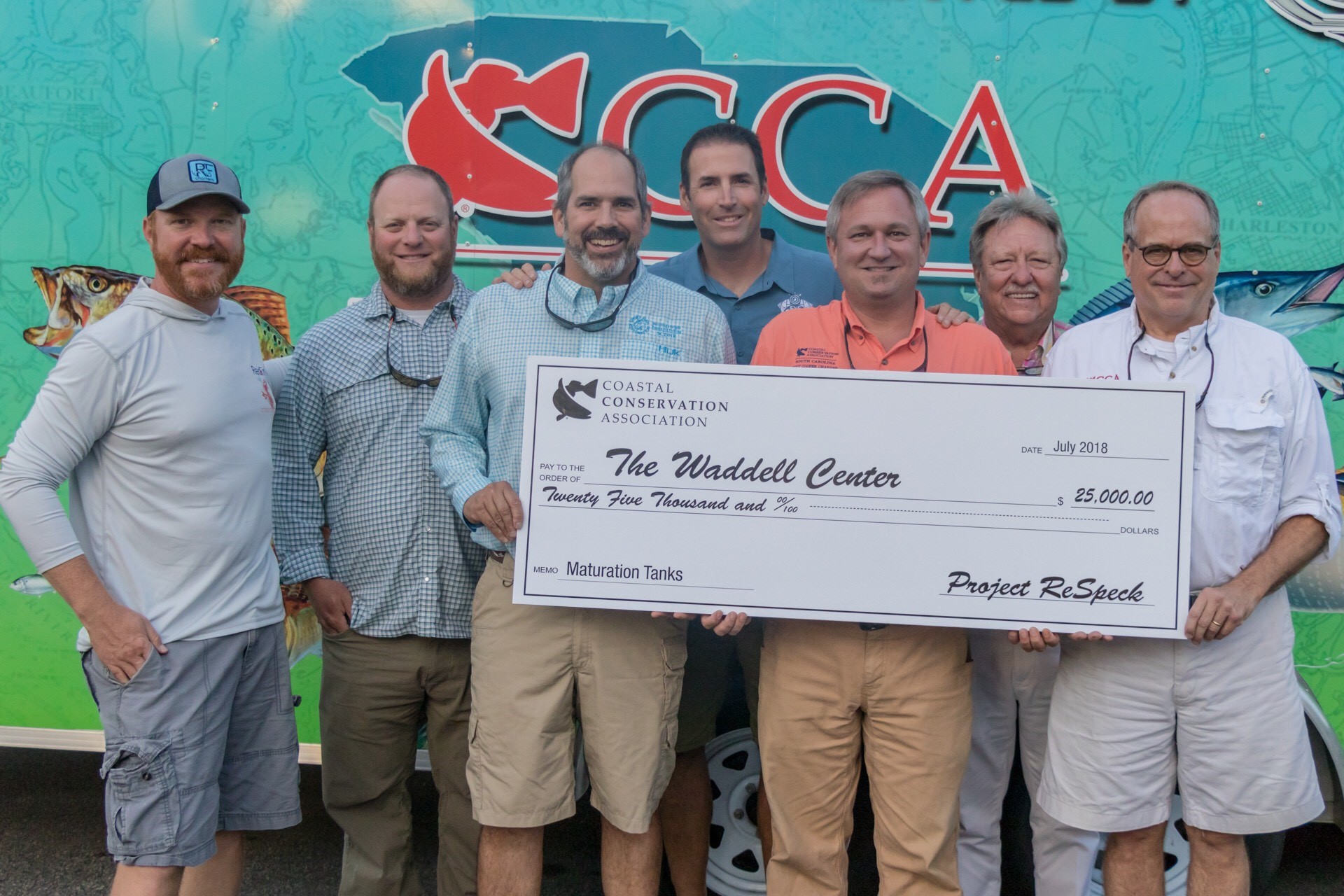
General Oglethorpe at Final Resting Place
[dt_gap height=”10″ /]In June 2018, CCA SC established its first Offshore Reef off the coast of Charleston. This is the story…
CCA South Carolina sinks the SS Oglethorpe from Catch 1 Films on Vimeo.
First 2018 STAR tagged redfish caught in Murrells Inlet!
[dt_gap height=”10″ /]***Breaking News***
First 2018 STAR tagged redfish caught in Murrells Inlet!
Columbia, SC – While enjoying the Palmetto State coast on vacation, an angler from Ohio was fishing with Capt Jay Baisch of Fishful Thinking Guide Service in Murrells Inlet, SC. The crew was having a good day of fun and fishing when a 20 inch redfish was brought to the boat. The fish was sporting tag #14 of the 2018 CCA South Carolina STAR tournament; a fish potentially worth a brand new Sea Hunt 22BX bay boat, Yamaha motor, and Wesco trailer valued at over $43,000. Unfortunately, the angler was not registered for the tournament and thereby missed out on the prize winning fish!
“We noticed immediately that the fish had a tag but simply mistook it for a SCDNR tag at the time” said Capt Jay. “It wasn’t until later that we noticed it was a STAR tag and immediately called the STAR number to report the catch”.
Now in its second year, the CCA South Carolina STAR Tournament presented by Sea Hunt Boat Company, is a nonprofit saltwater fishing tournament focused on attracting people to the Palmetto State’s outstanding coast and the important work of conservation, protection, and stewardship of our coastal resources – all of which are cornerstones of CCA South Carolina’s mission. The tournament gets families on the water and helps educate both angler and non-angler alike on the role we all play in those significant efforts. The tournament is takes place from Memorial Day to Labor Day each year. The tournament has released 60 specially tagged redfish along the coast of South Carolina and the first two CCA members registered for the tournament to catch a STAR- tagged redfish could win a new 2018 Sea Hunt Boat Company BX 22 BR bay boat, Yamaha 150 motor, and a Wesco aluminium trailer valued at over $43,000!
“The fish are tagged and out there” said Scott Whitaker, CCA SC executive director and STAR tournament director. “We have had four fish from last year’s inaugural year recaptured but this marks the first fish caught in the current tournament year. We are all pulling for someone to catch one of the remaining 59 fish as we really want to give away both of the prize boats this year. Anglers have until Labor Day weekend to make it happen”.
Don’t let this happen to you or your friends! Get registered NOW at www.joincca.org today and be ready when your opportunity strikes! Friends don’t let friends fish without being registered for STAR!
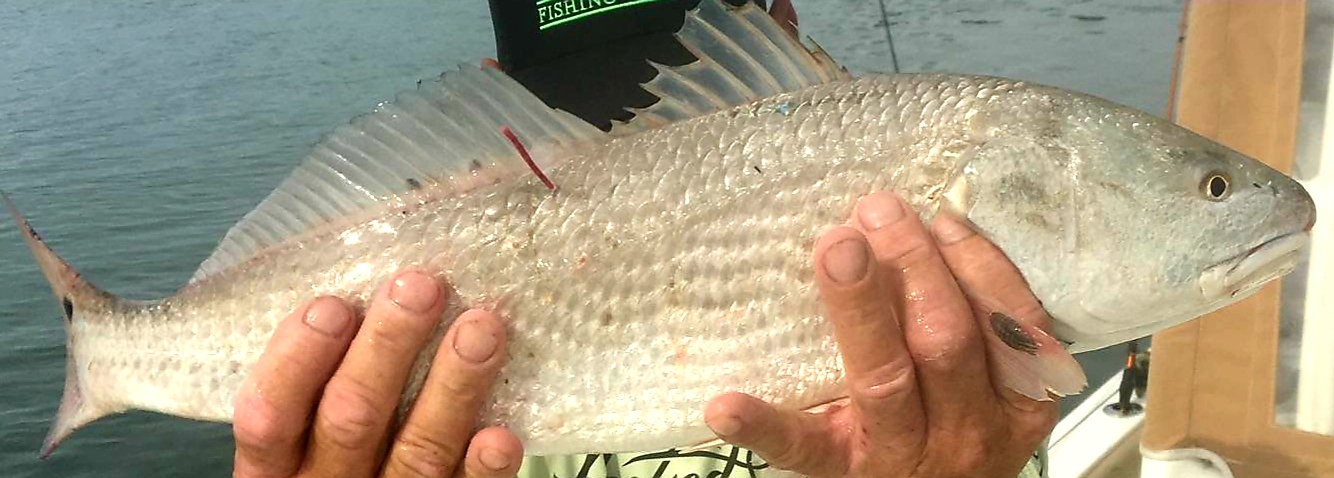
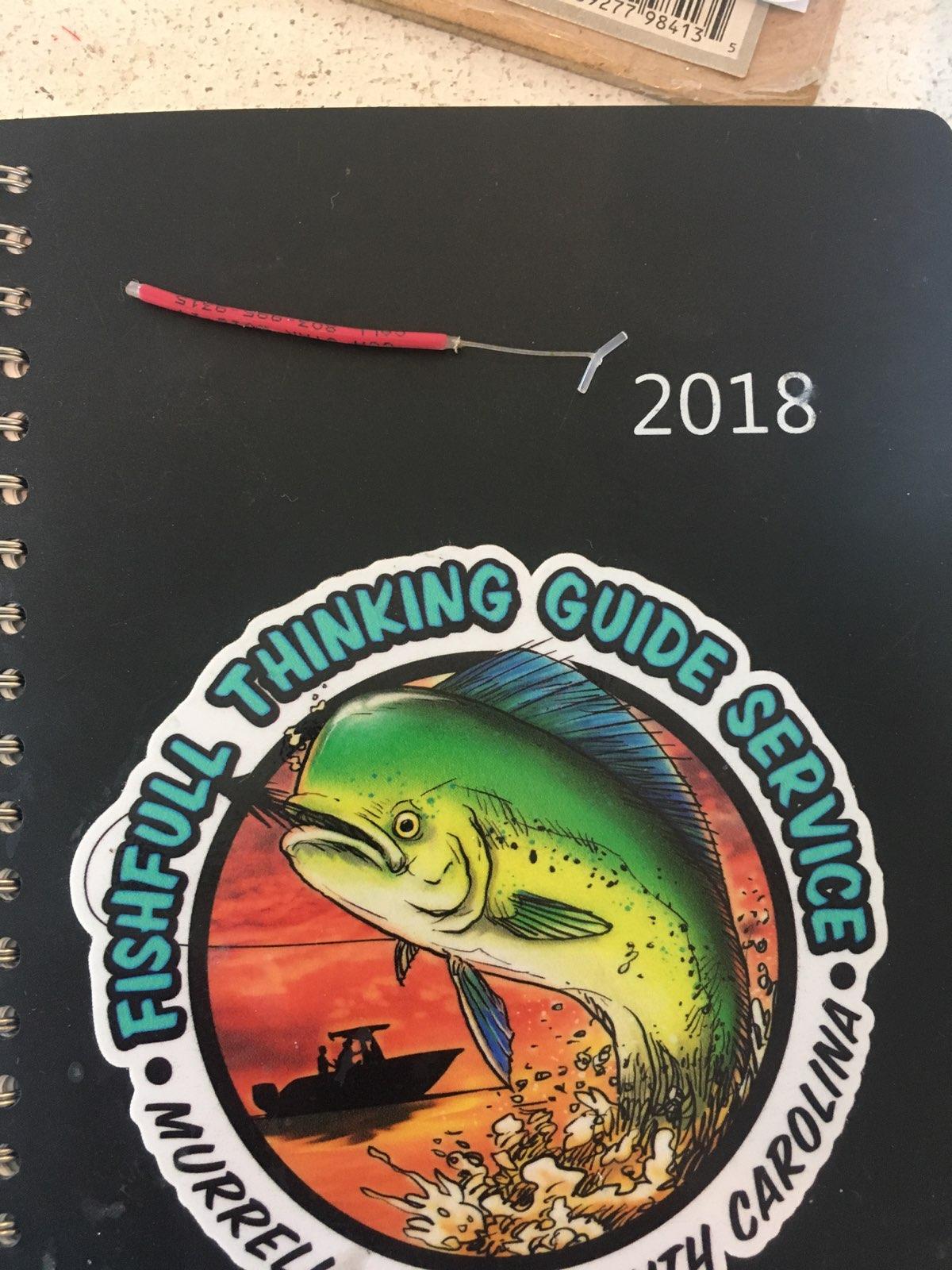
Modern Fish Act 101
[dt_gap height=”10″ /]From our friends at The Center for Sportfishing Policy:
Modern Fish Act 101
Time to Get Reel
As we celebrate National Fishing and Boating Week, a review of the Modern Fish Act is in order. A lot has been written about this bill by many different people — some informed and some uninformed. One thing is for sure — the Modern Fish Act is an unprecedented, sportfishing-focused fisheries management bill that is moving through both chambers of Congress. This bi-partisan legistlation aims to improve federal management of recreational fisheries while safeguarding sustainability for future generations.
Since school’s out for summer and many families are celebrating this week on the water, let’s look at what the bill accomplishes.
The Modern Fish Act:
- Requires periodic reviews of mixed-use fisheries allocations (i.e. those fished by both the commercial and recreational sectors) in the South Atlantic and Gulf of Mexico. It’s a no-brainer that the way a public resource is divvied up should be periodically examined, but that is not happening now.
- Clarifies that regional fishery management councils and NOAA Fisheries can implement management approaches such as harvest rate management that have been used successfully in some regions but that other regions have not even considered.
- Requires a National Academy of Sciences study of how Limited Access Privilege Programs (conveniently nicknamed “catch share” programs) in mixed-use fisheries could be improved to reduce user conflicts, and places a hold on implementing any new Limited Access Privilege Programs until the study’s results are public.
- Revises the rebuilding timeline requirement to ensure the timeframes are based on the biology of a depleted fishery, not an arbitrary 10-year rebuilding timeline. Anyone who supports science-based management should prefer this approach.
- Authorizes the use of multi-year and multi-species annual catch limits, which is simply a codification of recent updates to NOAA Fisheries guidelines.
- Requires NOAA Fisheries to respond if a state, regional fishery management council or interstate marine fisheries commission objects to an exempted fishing permit providing more clarity to the approval process.
- Requires a study of how third-party data, such as state-collected data through electronic reporting systems — e.g. iSnapper in Texas, La Creel in Louisiana, Tails ‘n Scales in Mississippi, Outdoor AL in Alabama and iAngler in Florida — could improve fisheries data. For many offshore fisheries, the federal program that estimates angler harvest — the Marine Recreational Information Program (MRIP) — does not provide data at the level of accuracy or timeliness needed for basic management, much less in-season management of various fisheries.
- Tells NOAA Fisheries to implement the recommendations of the recent National Academy of Sciences review of MRIP and to follow up on key questions raised in the report, for example whether/how management could be better adapted to align with available data.
The Modern Fish Act does NOT exempt recreational anglers from rules, regulations or laws. Anglers support science-based management which ensures the future of recreational fishing.
Science-based. Angler-focused. That’s the Modern Fish Act. And it’s time to get reel.
Jeff Angers

Habitat partners complete General Oglethorpe Reef
[dt_gap height=”10″ /]
Habitat partners complete General Oglethorpe Reef
CCA South Carolina and conservation partners splash first of three new reefs
Columbia, S.C. – Last week, Coastal Conservation Association South Carolina (CCA SC), the South Carolina Department of Natural Resources (SCDNR), and the Building Conservation Trust (BCT) – CCA’s national habitat program – completed the first of three projects aimed at expanding and enhancing offshore reef habitat in the Palmetto State. The 106-foot decommissioned tugboat General Oglethorpe was deployed some 30 miles off the coast of Charleston in approximately 100 feet of water, creating vital new fisheries habitat and establishing additional recreational angling opportunities for fishermen.
“These projects represent an ever expanding vision for CCA SC concerning projects and partnerships that improve both fisheries habitat and recreational angling opportunities in South Carolina,” said Gary Keisler, CCA SC’s Topwater Action Campaign coordinator. “From nearshore efforts focusing on water quality and estuarine habitat to scientific studies and monitoring of offshore habitat, CCA SC and our partners are working to enhance our coastal resources.”
All three of the projects will be placed at the same general depth but at different locations along the coastline. Deep-water reefs of this nature will benefit species ranging from the snapper-grouper complex to highly migratory species, providing a wide abundance of fish and marine life and making it a true destination for recreational anglers. The next deployment will be off the coast of Georgetown with another 100-foot tug and is simply awaiting favorable weather conditions. Later in the year, a final project will take place with a deployment of similar material off the coast of Beaufort/Hilton Head. These projects represent an approximate $300,000 investment by the partners.
According to former crew members, the General Oglethorpe was originally commissioned on the Great Lakes as an ice breaker and was an active participant in the search for the famous Edmund Fitzgerald until called off the search due to weather conditions that evening. From there, the tug made its way to the West Coast and later to the East Coast where it continued to work on the Savannah River right up to the day the partners stepped in and purchased the vessel.
“These tugboats will make tremendous additions to our artificial reefs, creating productive habitat for fish and anglers, as well as interesting dive sites for divers,” said Bob Martore, SCDNR’s Artificial Reef Coordinator. “We never would have been able to complete these projects without CCA SC’s assistance. We’re looking forward to undertaking many more reef-building projects with CCA SC and BCT in the future.”
###

CCA SC’s STAR tournament drums up support for tagging program
CCA SC’s STAR tournament drums up support for tagging program
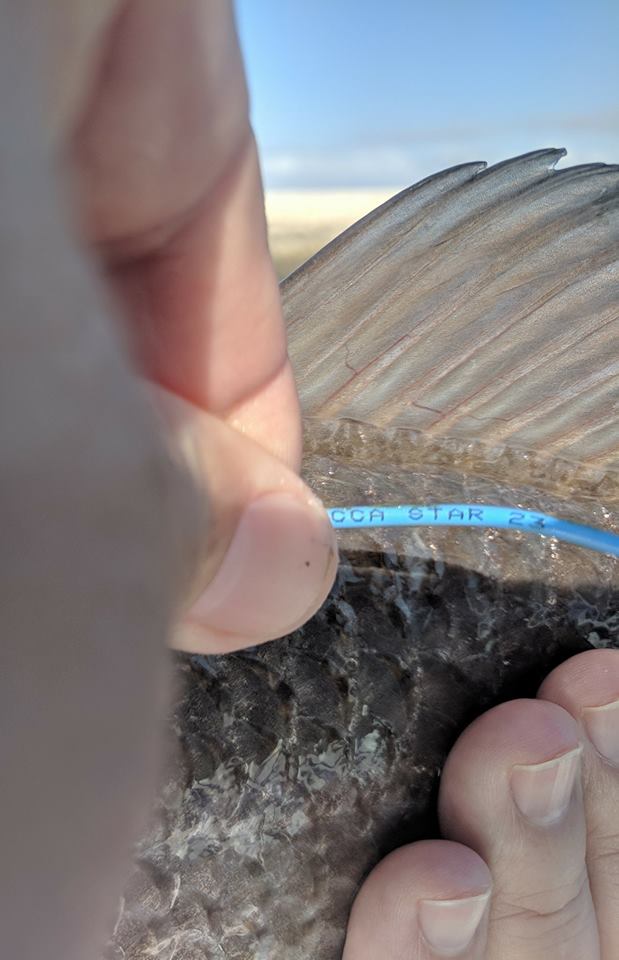
Columbia, S.C. – In 2017, CCA SC’s STAR Tournament, presented by Sea Hunt Boats, enjoyed its first year of offering recreational anglers the opportunity to participate in a coast-wide tagged red drum fishing tournament. A set number of tagged red drum (48) were released into the coastal waters along the entire coast of South Carolina. All a tournament-registered angler had to do was be one of the first two to catch one of these tagged fish. The prize? One of two new Sea Hunt BX 22 bay boats complete with Yamaha motor and WESCO trailer valued at approximately $43,000. Along with encouraging anglers to enjoy recreational fishing, the STAR tournament was created as an extension of CCA’s conservation efforts.
“As an organization, this was a goal of ours for sometime, so it was a real thrill to finally be able to put a plan into action and watch the tournament materialize,” said Michael Smith, STAR tournament co-chairman. “Needless to say, the tournament caught the attention of anglers across the Palmetto State as well as from neighboring states.”
In addition to executing a successful tournament in year one, CCA SC was pleased that the results allowed the organization to support data collection efforts via funding for the marine gamefish tagging program. Overseen by the South Carolina Department of Natural Resources since 1974, the tagging program has helped promote conservation of marine gamefish and increased public resource awareness. Through voluntary angler participation, biologists have been able to use the program as a tool to gather critically important resource management information such as migration and movement of stocks, growth rates, and habitat utilization.
“We were very pleased with the opening year of this tournament,” said Tombo Milliken, Jr, STAR tournament co-chairman. “To see the support of the fishing industry and to have recreational anglers respond to it as they did was wonderful, and being able to actually give back to conservation in the first year of the tournament means good things are ahead for both anglers and our marine resources.”
The CCA SC STAR tournament will launch again this year with Sea Hunt Boats providing the title sponsor support, as well as two BX 22 bay boat, motor, and trailer prize packages valued at approximately $43,000. Fishing begins on Memorial Day and ends on Labor Day. Tournament anglers must be current CCA members and registered for the tournament to be eligible. To join today, go to www.ccasouthcarolina.com.
CCA South Carolina celebrates 10 years of marine habitat work
CCA South Carolina celebrates 10 years of marine habitat work
Donation of two more trailers marks angling group’s ongoing commitment to improve state’s marine habitat

Columbia, S.C. – Ten years ago, Coastal Conservation Association South Carolina (CCA SC) launched its habitat program – The Topwater Action Campaign. Its focus was primarily to work with the SC Department of Natural Resources (SCDNR) Marine Division to create greater awareness of the importance of collecting and recycling used oyster shells throughout South Carolina. Fast forward to 2018 and as an extension of that commitment, CCA SC, Building Conservation Trust (BCT), and Toadfish Outfitters partnered to provide two additional dump trailers for a total of eight the program now has at its disposal provided by the Topwater Action Campaign. This latest contribution brings the total investment by CCA SC and its habitat partner’s to more than $100,000 in equipment alone to the SCDNR’s oyster programs.
“We’ve always said ‘conservation is a team sport,’ and CCA SC’s Topwater Action Campaign is a hallmark of partnership in marine conservation and stewardship,” said Robert Boyles, DNR Deputy Director for Marine Resources. “CCA SC has provided hundreds of thousands of dollars in funding and equipment to the DNR to support oyster shell recycling and reef-building activities. In addition to equipment, CCA volunteers have contributed thousands of hours to construct oyster reef habitat up and down the South Carolina coast, providing much-needed muscle, moral support, and investment in habitat creation and stewardship. We simply could not have had the impact in promoting a strong marine conservation ethic without them.”
Working with local partners like Toadfish Outfitters, CCA SC and the Building Conservation Trust (BCT), CCA’s national habitat program, have been able to invest not just in estuarine habitat project such as oyster reefs, but also in nearshore and offshore reefs, thereby supporting the entire scope of marine habitat. The Topwater Action Campaign has also funded water quality studies and will be expanding its support to scientific research and fisheries monitoring studies in 2018 to support data collection for stock assessments, seeking to answer habitat questions, and provide information for fisheries management decisions.
“Toadfish Outfitters is exceptionally proud to be a part of this effort and it’s being a part of efforts like this that honestly led to the founding of Toadfish Outfitters,” said Casey Davidson, president of Toadfish Outfitters. “These waters, these estuaries, these marine resources are a part of our DNA here at Toadfish Outfitters and we will continue to pledge our resources and our support to programs and projects through the SCDNR and CCA that improve them.”
“Throughout its history as an angling advocacy group, CCA SC has been there to take on the challenges facing recreational anglers. For years that was in the fisheries management process which in SC is in the General Assembly,” said Mike Able, CCA SC Government Relations Committee chairman. “We will continue to do that and our reputation is one that is highly valued and sought-out in that arena. However, CCA SC is committed to a holistic approach to the wide variety of issues affecting our marine resources, including habitat, research, and data collection. To have valued partners and enthusiastic members provide the resources to do all of that is what makes CCA the most complete recreational angling advocacy group in the Palmetto State and in country.”
CCA SC putting oyster shells in the bag for 10 years running
CCA SC putting oyster shells in the bag for 10 years running
Army of volunteers recycle shells from world’s largest oyster roast

Columbia, SC – Heralded as one of the top 20 events in the Southeast as well as the world’s largest oyster roast, the annual Lowcountry Oyster Festival at Boone Hall Plantation in Mt. Pleasant is a celebration of all things oysters. Nearly 80,000 pounds of the bivalves are steamed or roasted in one day for the large crowds of people gathered to consume them. Since 2008, Coastal Conservation Association South Carolina (CCA SC) has organized a group of volunteers to collect and recycle the empty shells for the building of new oyster reefs in the estuaries of the Palmetto State.
“This has been an amazing effort to be a part of,” said Gary Keisler, CCA SC Topwater Action Campaign chairman and organizer of the volunteers. “Looking back on where we started from, to see all the volunteers we now have participating is simply inspiring. Even the attendees now participate in the process and the level of cooperation between the Restaurant Association, CCA SC, and the SCDNR has grown so much that we now expect to recycle as close to 100 percent of the shells as we can get.”
When the group first began working with the Charleston Restaurant Association staff and the South Carolina Department of Natural Resources, the effort seemed daunting. Started in 2008 with an intrepid group of a half dozen volunteers, the effort has grown to 155 shell collectors in 2017 as well as 70 volunteers from the Culinary Institute at Trident Tech in Charleston and students from MUSC helping for the first time in 2018. Now, a large percentage of the task of the day focuses on educating event attendees on what they, the “oyster recovery team” volunteers, are doing and why.
“We were totally filthy at the end of the day those first few years,” said Keisler. “Between picking up shells left on the ground and shifting through the shells to remove the trash, it was dirty work. Now, people see the benefit of why we are doing it and help us out a lot more. We simply see it as a celebration with a purpose.”
Over the 10 years that CCA SC has been participating, more than half a million pounds of shells, about 10,755 bushels, have been collected at this one event. In that same time frame, CCA SC has invested more than $80,000 in equipment and donated it to SCDNR to establish and maintain a fleet of tools and vehicles specifically for oyster recycling and deployment. The recreational angling group truly recognizes oyster recycling and oyster reef restoration as a cornerstone of its expanding list of habitat work to benefit both South Carolina’s marine resources as well as Palmetto State anglers.
“This event is really a fantastic opportunity for us to acquire a lot of reef material in one location on one day,” said Scott Whitaker, CCA SC executive director. “And it all gets put right back into our creeks and tidal marshes to facilitate the growth of new oyster reefs which in turn contributes to cleaner water, creates juvenile fish habitat, and provides erosion control. It really is a wonderful conservation story and a tradition we think goes hand-in-hand with cool, crisp, lowcountry weather and steaming hot oysters.”
CCA SC applauds Senate sub-committee for taking first step toward recovering Red Drum stock
[dt_gap height=”10″ /]
CCA SC applauds Senate sub-committee for taking first step toward recovering Red Drum stock
Columbia, S.C. – The subcommittee of the South Carolina Senate Fish, Game, and Forestry committee took a vital step yesterday in the recovery and the conservation of South Carolina’s most popular saltwater gamefish, red drum. The legislation, S. 933, would make several key adjustments to existing management measures, including a reduction in the daily creel limit from three fish to two fish per person. Additionally, it creates a new daily limit of six fish per boat. The current slot limit of 15-23 inches would be retained.
“We applaud the steps the subcommittee took concerning the stewardship of red drum and we look forward to working with the state to implement this essential piece of conservation-minded legislation,” said Mike Able, CCA SC Government Relations committee chairman. “We understand we are in the early stages of the legislative process, but we are optimistic that every management option will be considered for the sustainability of this immensely popular species.”
Red drum is regionally managed by a fishery management plan under the guidance of the Atlantic States Marine Fisheries Commission (ASMFC). The ASMFC plan calls for a regional spawning potential ratio of 40 percent for the species. That rate has fluctuated between 30 and 40 percent over the last 10 years, but currently in South Carolina waters the rate is estimated at approximately 20 percent. South Carolina has seen slightly lower numbers in the past, nearly two decades ago, but with the cooperation of decision makers, fisheries managers, and the angling public, measures put in place to reverse that ratio were productive and the current effort is fully expected to yield similar results to put red drum back on solid footing..
“Anglers are ready to do our part to get red drum numbers back up and we greatly appreciate the subcommittee taking this needed first step for the benefit of South Carolina’s red drum,” said Tombo Milliken, Jr, CCA SC Government Relations Committee chairman. “We look forward to working with the general assembly to explore any and all viable steps that work towards the recovery of this iconic recreational species.”
CCA SC’s newest habitat projects going to new depths
[dt_gap height=”10″ /]CCA SC’s newest habitat projects going to new depths
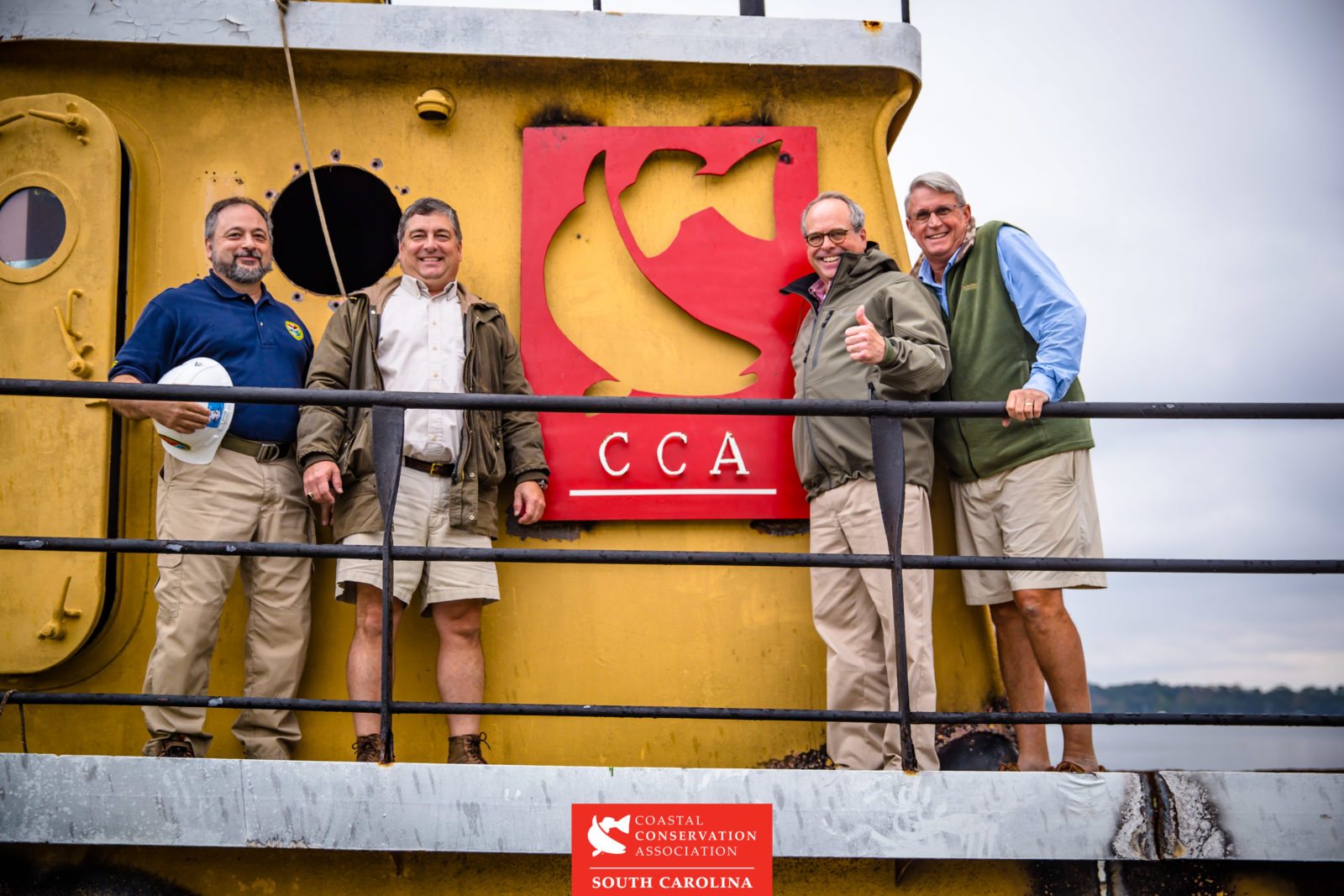
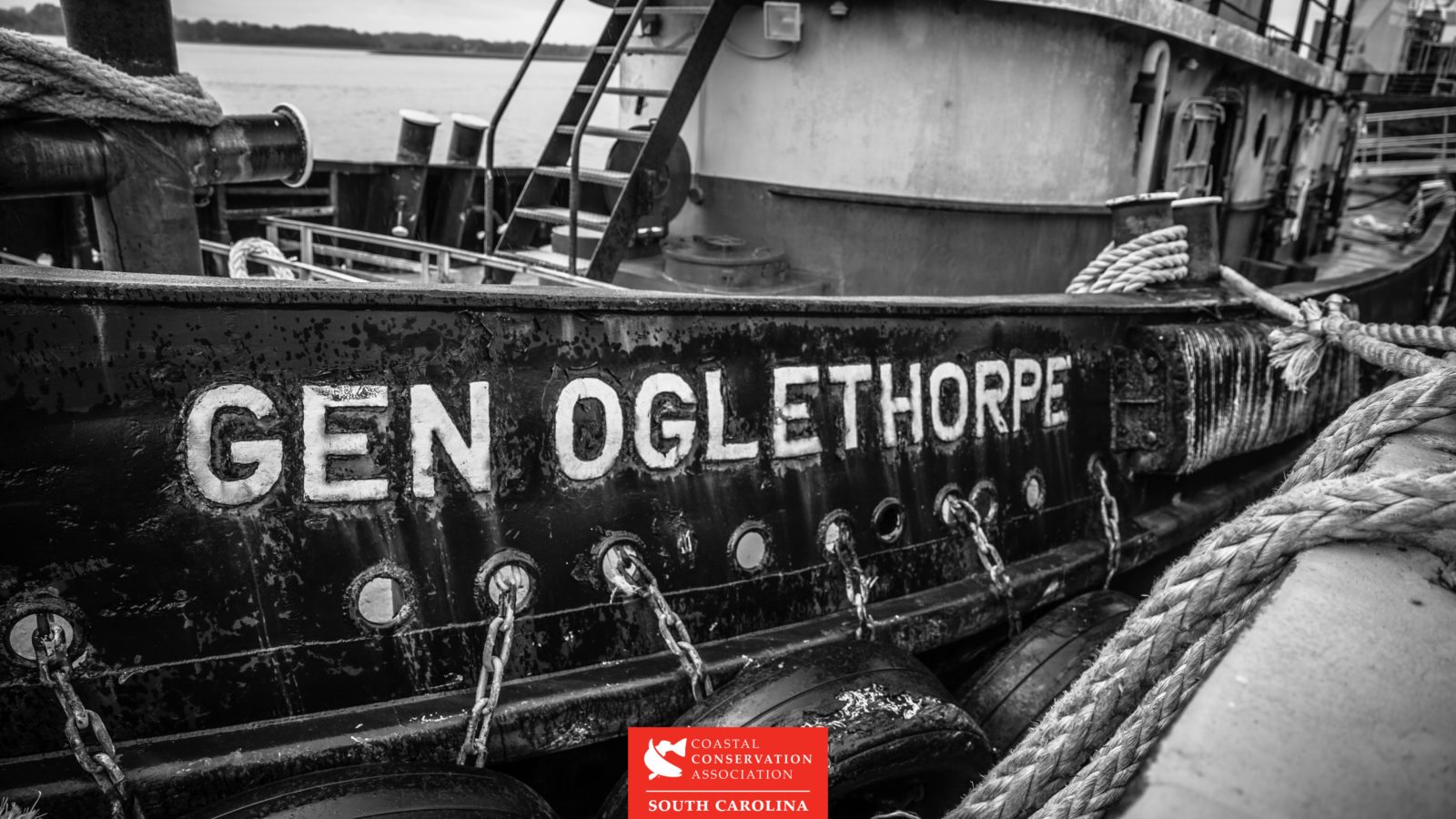
Columbia, SC – For the last eight years, CCA SC’s habitat initiative has provided remarkable results for marine resources and anglers alike. From providing tens of thousands of dollars in oyster recycling equipment, hundreds of volunteer man-hours for oyster reef restoration, providing funding for water quality studies, to establishing a string of seven nearshore reefs in 50 feet of water along the entire state’s coastline, the program is widely respected by fisheries managers, state & federal agencies, and most importantly anglers. Now, the program is expanding its project list to even deeper depths.
In the next few weeks, weather permitting, the organization is planning to establish the first of three deepwater reefs (100 feet of water or more) for the benefit of species in the snapper/grouper complex and the recreational anglers who pursue them. Two of the three projects are prepped and waiting for Mother Nature to provide calm seas for transporting the material. The first project will go off the coast of Charleston and consists of a 106-foot decommissioned tugboat. The second will immediately follow and consists of another large, 98-foot decommissioned tugboat to be placed off the coast of Georgetown.
The two projects represent an investment in marine habitat nearing $200,000 by CCA SC and its partners, CCA’s national marine habitat program The Building Conservation Trust (BCT), the South Carolina Department of Natural Resources, and the Greenville Saltwater Fishing Club. The search for material for the third of these projects is ongoing and will be placed off the coast somewhere in the Beaufort/Hilton Head Island vicinity once the material has been obtained.
“These tugboats will make tremendous additions to our artificial reefs, creating productive habitat for fish and anglers, as well as interesting dive sites for divers,” said Bob Martore, SCDNR’s Artificial Reef Coordinator. “We never would have been able to complete these projects without the assistance of CCA SC. We’re looking forward to undertaking many more reef-building projects with CCA SC and BCT in the future.”
“With the completion of these three projects, CCA SC will have reached another milestone in our habitat initiative vision,” said CCA SC Executive Director Scott Whitaker. “Eight years ago, these types of projects were simply dreams the organization had when we began our efforts with oyster habitat. Now we are looking at conducting large habitat projects as well as funding scientific finfish research and the monitoring of habitat to help scientist, managers, and anglers improve both abundance and access in our fisheries for the enjoyment of the general public. It is truly an amazing evolution and we are excited about future projects.”
